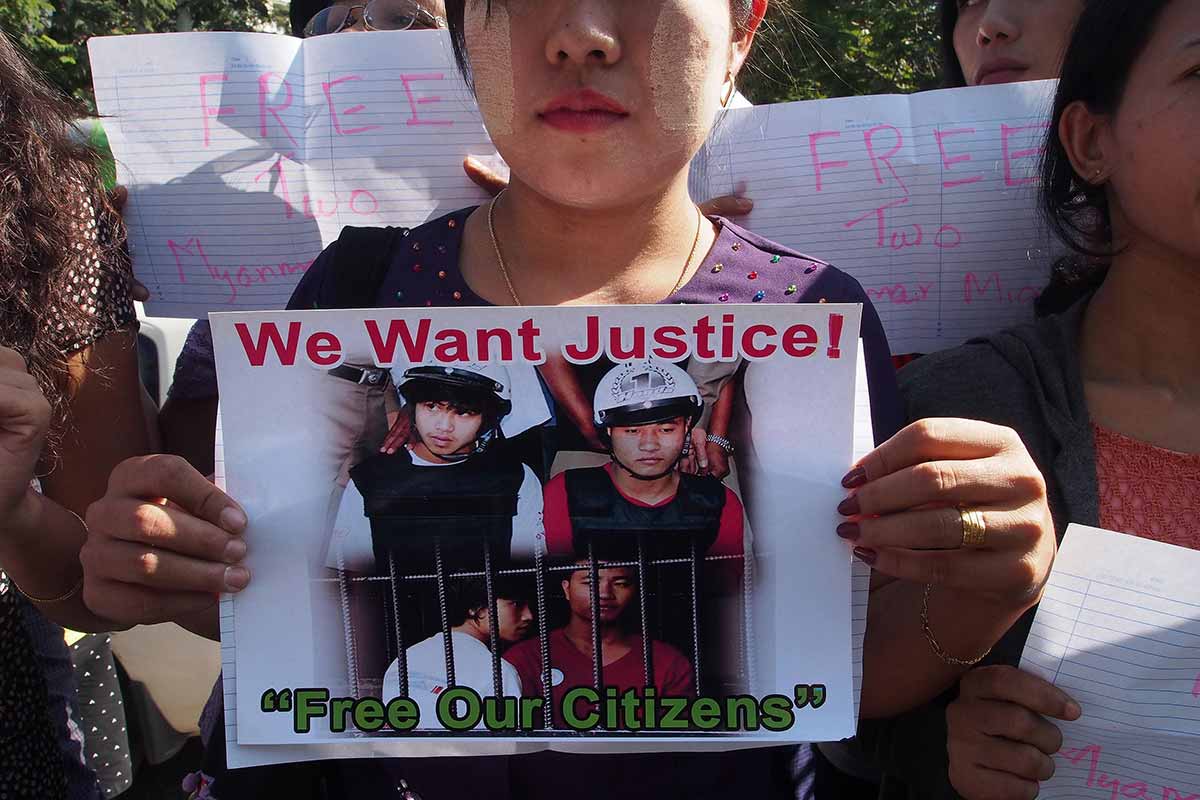Demonstrators hold placards outside the Thai embassy as they protest against the death sentence of Myanmar labour workers Zaw Lin and Win Zaw Tun for the murder of two British backpackers, in Yangon on December 25, 2015. (Phyo Hein Kyaw / AFP Photo)
On 10 October, also known as World Day Against the Death Penalty, Malaysia’s minister in charge of law in the Prime Minister’s Department Liew Vui Keong announced that the cabinet has agreed to abolish the death penalty. Vui Keong told the media that the government will table a bill in the next parliament sitting to abolish the death penalty.
This comes as a pleasant surprise for many as Malaysia has been actively enforcing the death penalty. In 2016, the country had nine recorded executions with another 1,042 people on death row. Many see the announcement as a positive move for the region as it could inspire other countries to follow in Malaysia’s footsteps.
At the moment, the only countries in the region to have abolished the death penalty for all crimes are the Philippines and Cambodia – with the Philippines abolishing it in 2007 and Cambodia being the first to do so in 1989. However, some observers believe that ASEAN member states might warm to the global trend of ending capital punishment. According to Amnesty International’s Global Report on Death Sentences and Executions released in 2016, at the end of that year, a total of 104 countries had abolished the death penalty as opposed to only 64 countries in 1997.
Source: Death Penalty Worldwide
Not in practice
At a glance, many countries have effectively stopped practicing the death penalty despite it not being officially abolished. For example, although it is facing mounting criticisms over other human rights abuses such as the treatment of the Rohingya, Myanmar is considered “abolitionist de facto” – meaning that the death penalty is retained in law but is not actually put into practice. This classification is due to the fact that the last known execution under the death penalty there was carried out in 1988. In 2014, then President Thein Sein commuted all death sentences in the country to life imprisonment.
However, any chance of Myanmar abolishing the death penalty is slim. Death sentences are still pronounced in the country’s courts. Ever since Aung San Suu Kyi’s National League for Democracy came into power in 2016, 66 criminals have been sentenced to death, of which 33 are appealing their sentences. In addition to that, the Deputy Director of Myanmar’s Prison Department, U Min Tun Soe has publicly stated that the status quo on the death penalty is likely to continue.
Myanmar aside, Brunei and Lao PDR are also considered “abolitionist de facto” countries by death penalty watchdog Death Penalty Worldwide.
Previously, Thailand was also classified as “abolitionist de facto”. However, that changed when Thai authorities executed a 26-year-old man by lethal injection on 18 June, 2018, the country’s first execution since August 2009.
A setback
Thailand’s decision to execute the man has drawn the ire of many local and international rights groups. Some say this has reversed the progress the country has made towards ending death penalties in the country. Currently, Thailand has the highest number of inmates who have been given death sentences with 517 on death row. 216 of these sentences were given out in 2016 alone.
While Malaysia has mentioned that it will abolish the death penalty, the country, along with Singapore, Vietnam and Indonesia are seen as active enforcers of it.
In Amnesty International’s 2016 report, Malaysia and Vietnam were said to have “…painted an alarming picture of the use of the death penalty.” Vietnam keeps their figures classified under state secrets but Amnesty International believes that Vietnam is among the top offenders in carrying out executions with more than 400 executions from August 2013 to June 2016. Meanwhile, Singapore and Indonesia recorded 4 executions each.
At the moment, aside from Malaysia, these countries show no indication of completely abolishing the death penalty. Though, efforts by pressure groups and NGO’s have pushed the discourse regarding the death penalty in these countries. In Indonesia, President Jokowi said in an interview last year that he would consider a moratorium on capital punishment if the people want it.
As Thailand has shown, a moratorium on the death penalty is not enough as it can easily be reversed. The only way to end the death penalty is for it to be completely abolished.
As long as the drug trade continues to be profitable in this region, ministers and governments will continue to justify the use of the death penalty as a deterrent. However, Malaysia has proved that the abolition of the death penalty is not impossible. As long as consistent pressure is put on these governments, the region could one day be free of the death penalty.


